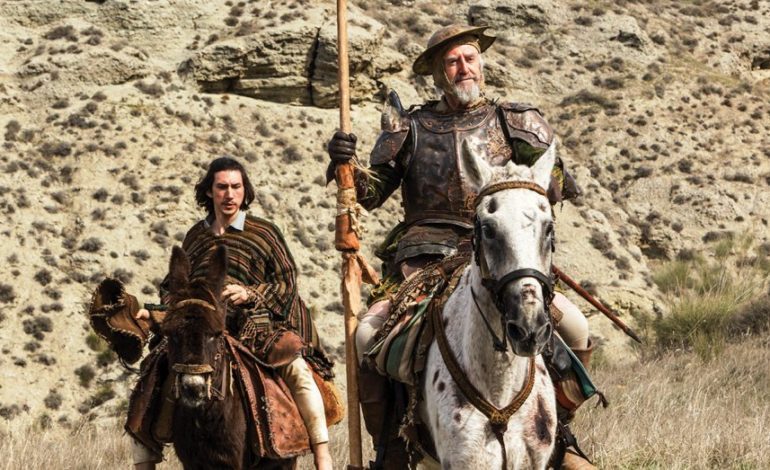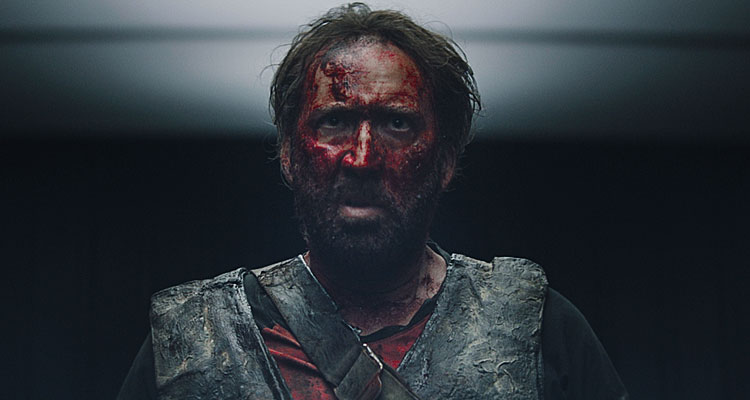ALL REVIEWS WRITTEN BY GREG KING
LAST UPDATED AUGUST 17, 2018
THE MAN WHO KILLED DON QUIXOTE.

The struggles faced by idiosyncratic and maverick filmmaker Terry Gilliam in trying to bring to the screen his long gestating passion project about Don Quixote have been well detailed in the fascinating 2002 documentary Lost In La Mancha. That film told of the storms that destroyed sets, the lack of financial support and the ill health of its star, all of which combined to halt production within a week of the project starting physical production. Now some twenty years later we finally get to see Gilliam’s vision reach the screen. And it is a flawed, imperfect and unwieldy beast liberally filled with the filmmaker’s signature stylistic touches and unique, quirky sensibility. Co-written with Tony Grisoni (who collaborated on the equally bizarre and incomprehensible Tideland), this something of a shambolic mess with its chaotic structure and non-linear narrative. The Man Who Killed Don Quixote is very meta in style, with lots of references to the original concept that Gilliam began shooting in 2001. But it is also a trenchant critique of the filmmaking process itself as well as the producers and backers who like to play it safe. The film is heavily driven by some inane slapstick sequences and lots of busy subplots, many of which end up going nowhere. Gilliam has recast the roles that were originally intended for Johnny Depp and the late Jean Rochefort.
Adam Driver steps into the role of Toby, the egocentric and hapless central character, a filmmaker who comes to Spain to shoot a Russian vodka commercial for his financiers. While in Spain he comes across an old student film he shot ten years earlier telling the story of the chivalrous knight errant Don Quixote. Toby cast Javier (Jonathan Pryce) in the role of the knight who tilted at windmills. Now Toby reconnects with Javier, who has become delusional and really believes that he is Quixote. Javier mistakenly identifies Toby as his faithful but dim-witted servant Sancho Panza, and the pair reluctantly set out on a road trip across the countryside with plenty of comic misadventures. But the film goes off the rails by the third act as Gilliam tends to throw just about everything at the screen in the hope that some of it sticks with his frenzied, nonsensical approach. The film has been nicely shot in widescreen by Nicola Pecorini, who captures the magnificent wide-open spaces of the setting. Costume designer Lena Mossum uses the original Quixote suit of armour created for Gilliam’s 2001 film by designer Gabriella Pescucci. Pryce and Driver create a wonderful odd couple dynamic that drives the film. Driver brings a lugubrious quality to his performance and throws himself into the more physical elements of the performance, while Pryce is hilarious as the heroic dreamer and delusional warrior. The musical Man Of La Mancha remains firmly entrenched in the minds of most cinemagoers and this fanciful take on Cervantes’ legend of Don Quixote is unlikely to dislodge those memories. Ironically this is another example of Gilliam tilting at cinematic windmills.
★☆
MANDY.

This frenzied and bonkers revenge flick is the sophomore feature from filmmaker Panos Cosmatos, the son of the late director George Pan Cosmatos, who made slick albeit generic action films like Rambo, Tombstone, etc. Mandy is ideal for the late-night slot at film festivals where it will find an appreciative audience. The film stars Nicolas Cage, who delivers another intense and over the top performance as Red Miller, a lumberjack whose wife (Andrea Riseborough) is brutally murdered by the acolytes of a nutty religious cult led by Jeremiah (Linus Roache, from Law & Order, etc). Armed with a crossbow and a specially crafted axe, Red descends into a hellish underworld to seek vengeance against the so-called Children of the New Dawn. There he tackles demonic bikers and other assorted freaks. Cosmatos (Beyond The Black Rainbow) delivers plenty of ultra-violence here with lots of blood and gore and decapitations, and even a fight to the grisly death with chain saws. Cage delivers his patented intense glare while bathed in blood. Cage only has about a dozen lines of dialogue here, so his performance is much more physical and relies on his expressions and grimaces to convey his pain and rage. He also brings a self-awareness to the role, as the revenge fuelled aggrieved victim is becoming a staple of Cage’s repertoire of late. The film has been stylishly directed by Cosmatos who stretches his limited budget and resources. Cinematographer Ben Loeb (King Cobra, etc) has bathed the film in a garish red palette that is symbolic of blood, hell and supernatural portents, and lends a surreal quality to the material. The action is also accompanied by a brooding and ominous score from the late Johann Johannson, his last completed score. ★★☆
WILDLIFE.

The opening night film for the Melbourne International Film Festival this year was Wildlife, which marks the directorial debut for Paul Dano, an actor better known for playing troubled and eccentric characters in films like Little Miss Sunshine and Prisoners, etc.
Set in Montana in the 1960s this is a coming of age drama about the Brinson family and the disintegration of their marriage. Jerry (Jake Gyllenhaal, from Nightcrawler, etc) is a foolish but proud man but is unable to hold down a job. When he is fired from his position at the local country club the cracks begin to show in the marriage. His wife Jeanette (Carey Mulligan, from An Education, etc) becomes increasingly aware of his shortcomings. Then Jerry enlists as a volunteer to go and fight a wild fire raging out of control in the mountains. While he is away Joe finds part time work with a local photographer and Jeanette begins an affair with local shoe salesman Warren Miller (Bill Camp). Events are seen from the perspective of their teenage son Joe (played by Australian actor Ed Oxenbould, from Paper Planes, The Visit, etc), who witnesses the pain as his parents virtually become strangers to each other.
Wildlife is based on the 1990 novel written by Richard Ford, widely regarded as one of the finest writers of his generation. The novel that resonated strongly with Dano. This is something of a passion project for Dano, who adapted the novel with his partner Zoe Kazan, with whom he co-starred in 2012’s offbeat comedy Ruby Sparks. This gently paced and quiet film is an exploration of love and pain and the messiness of life. The film is steeped in an authenticity and suffused with an air of foreboding. Dano understands the power of silence and stillness. The film has been beautifully shot in widescreen by cinematographer Diego Garcia (Neon Bull, etc), who captures the slow pace of life in small town America.
AS an actor himself Dano obviously knows how to work with his actors, and he draws strong but subtly nuanced and effective performances from his cast. Gyllenhaal is strong as Jerry, whose failings as a man and a father become more apparent as the film moves along. Mulligan is strong as the frustrated Jeanette who finds sexual liberation. Oxenbould delivers a great performance that conveys the pain and confusion Joe feels as he watches events unfold. Wildlife marks an auspicious debut for Dano. ★★★☆
LEAN ON PETE is a gritty coming of age story about a boy and his love for a horse. Fifteen-year old Charley Thompson (played by Charlie Plummer, who played Christopher Plummer’s kidnapped grandson in the drama All The Money In The World) is a itinerant teen who is travelling around Oregon with his father (Travis Fimmel) who is looking for work. Charley lands a job working in a stable, and forms an attachment with an aging race horse named Lean On Pete, which is trained by Del (Steve Buscemi). When Charley’s father is shot and dies in hospital, his world begins to crumble. Then he learns that the horse is about to be shipped off to Mexico to be slaughtered and he takes matters into his own hand. He makes off with the horse and embarks on a journey to find his aunt Margy, whom he hasn’t seen in years. Along the way he has encounters with people and some adventures that lead him into sometimes dangerous territory. He experiences violence and the harsher realities of life. Set in Oregon, the film captures the wide-open landscapes and vistas which are beautifully shot by the widescreen lensing of Danish cinematographer Magnus Nordenhof Jonck (A Hijacking, etc). Lean On Pete has been adapted from the 2010 novel written by Willy Vlautin by British director Andrew Haigh (the gay romance Weekend and 45 Years). This is the fourth feature for Haigh, who brings an unsympathetic perspective to this view of life in contemporary America. He maintains a low-key approach to the drama and there is a real sense of intimacy in the relationship that develops between Charley and the horse. Plummer, who is on screen for the whole film, delivers a committed and natural performance that captures his damaged character’s vulnerability, uncertainty and desperate need to find a connection in this often-cruel world. The story resonated with him personally. Good support from Buscemi, Steve Zahn and Chloe Sevigny. ★★★




